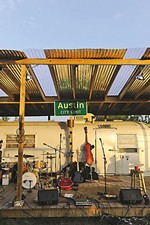Mayor’s Omnibus Resolution: Actualization Is Hard
Moving into Phase II
By Doug Freeman, Fri., Feb. 24, 2017
From outside, the Mosaic Sound Collective doesn't inspire a lot of confidence. The white concrete bunker just east of 183 on MLK once served as a convalescent home and juvenile detention facility. For now, it retains all the charm of its previous applications.
Dan Redman sees something different. As he tours the 25,000-sq.-ft. maze of hallways and rooms, his vision for the space becomes tangible. He points out the wing dedicated to offices and classrooms, rehearsal spaces for bands, and an area dedicated to manufacturing, with plans for screenprinting facilities and vinyl pressing.
Producer Stuart Sullivan has already set up the new home for his Wire Recording Studio in one part of the building, relocating to Mosaic after rent on his former South Lamar studio spiked from $1,600 a month to $8,500. Redman continues talks with other producers (see "Playback," Feb. 24), as well as various music businesses and nonprofits, including a new music-tech incubator, to take up residency in the building.
"We want to create a membership-based collective where we have all these resources and services available for artists, while keeping it affordable as a nonprofit," explains Redman, parent to two-thirds of major label ATX grunge trio Residual Kid. "The model is a hybrid for-profit/nonprofit, so we can create the sustainability model and not always be in fundraising mode – actually be able to pay for and fund the nonprofit side.
"And we'll own it," he emphasizes, "so we won't have many of the same issues a lot of clubs and other facilities have had."
Next on Redman's priority list is permitting from the city to create a live music space on the property, as well as food and beverage. He's already secured rezoning of the 7 acres behind the complex for 168 affordable housing units.
Creative industry hubs like Redman's have garnered more attention, and urgency, over the last year as the issue of affordability has taken center stage for the local arts community (revisit "We Can't Make It Here Anymore," May 27, 2016). Last February Mayor Steve Adler put forth the Austin Music & Creative Ecosystem Omnibus Resolution, a creative stimulus package for Austin's music and art sectors. One year later, portions of the resolution are finally being undertaken by the city, if slowly.
When the Economic Development Department delivered its 68-page "Music & Creative Ecosystem Stabilization Recommendations" report to City Council in June, they outlined 10 priorities culled from more than 70 individual recommendations. Those priorities focused on: Affordable Space; Agent of Change Principle; Cultural Tourism; Entertainment License; Incentives, Tools & Loans; Land Use Regulations; Music Genre Development; Permitting & Licensing; Professional Development; and Revenue Development. (See "Omnibus Resolution Report Arrives," June 27, 2016).
"Out of all the recommendations, they've so far tapped three directly," says Music Commission Chair Gavin Garcia, emphasizing that the 2017 city budget focuses specifically on what were determined to be crisis issues for the arts community.
Without catching his breath, on Dec. 26 the mayor posted another proposal, this one a draft resolution pursuing the Music & Creative Ecosystem initiative previously approved by Council, with $475,000 designated in this year's budget for implementation. Adler's resolution would direct staff to move forward with four elements: 1) a case study for extended venue hours in the Red River Cultural District; 2) $200,000 in "transition funding" for performing arts venues; 3) $75,000 to implement a "Revenue Development Platform"; and 4) $200,000 for "creation of an Entertainment Services Group and the Nightlight Initiative."
"From the Music Commission's perspective, we were also very satisfied with the mayor's engagement that yielded the Neighborly Challenge $10 million mini-bond [see "Crowdfunding Austin Music Venues," Sept. 22, 2016], which underscores his commitment to the local music industry," offers Garcia of the past year's efforts. "And the pilot program for the Red River Cultural District was a win that addresses another hot button issue, which is the survival of incubator venues."
Now Mayor Adler has convened "Phase II" of the Omnibus plan, establishing five municipal groups to take up the other recommendations not being addressed. Yet even as those committees begin the process of research and receiving input from stakeholders throughout the city, skepticism of just how effective the city can be in helping spur the creative ecosystem resurfaced with last week's resignation of City Music Manager Don Pitts, specifically citing the challenges of city bureaucracy.
"As a music industry person, I realize I work differently," wrote Pitts in his resignation letter. "I understand why protocol is important in the life of a city bureaucracy, and I realize it is time for me to not work within a bureaucracy any longer."
Pitts' exit, due in April after the city made him an interim internal consultant to ease the transition to a new manager, highlights that while Mayor Adler and City Council may aggressively champion efforts to bolster Austin's music scene, their impact can only extend so far against a limited budget, competing city priorities, and the necessary restrictions of bureaucracy.
"The city has been very supportive, Mayor Adler has been great to work with and has endorsed us, but we're not really asking for anything," acknowledges Redman, who has bootstrapped funding for Mosaic himself. "In meeting with the city, our goal has always been that we'd love their voice and advocacy for making this program work, but I think once you get into the bureaucracy of everything, it's difficult to get things done. The Omnibus Resolution is fantastic, though the actualization is hard."
"What the city, in my belief, can do the most is support infrastructure and the foundational things that then people can lift themselves up with," agrees Sullivan as he shows off his studio. "It's not the city's job to make people successful, but it is the city's job to create the opportunity for individual businesses to be able to come in and be successful."
As the mayor moves into Phase II of the Omnibus plan, distinguishing between where the city can lead in supporting the music community and where it would be more effective in advancing existing projects, will largely determine the impact of its initiatives. The pilot program to extend club hours for the Red River Cultural District and effort to install Agent of Change rules (see "Playback: The Westin Sues the Nook Over Sound," Jan. 6) offer two ideal examples of how the city can best leverage its role. Yet the music community knows it can't simply wait on the city for support, and efforts like Black Fret, Mosaic, and ATX6 have provided templates for necessary new models of public engagement.
"We want to partner with the city," says Chris Brecht, who founded ATX6 three years ago. "We want the city to get behind what we're doing and help us, and maybe make it just a little bit easier with some money that's actually set aside for projects just like this."
ATX6 reflects one of the Omnibus' priorities in providing an export program for Austin artists (see "The French Connection: ATX6," Sept. 9, 2016). While the project received last minute funding from the city in its initial year to send the group of homegrown musicians to North by Northeast in Toronto, it has since only been able to barely break even through fundraising shows and donations from local venues and businesses, even as it has proven wildly successful in fostering international opportunities for local musicians. Brecht believes support from the city would allow the project to reach its full potential.
"The challenge for the government is to find resources to support the industry, namely monetary, while it takes bows as the most livable city in the U.S.," challenges Garcia. "From my perspective, I see the need for a central advisory or leadership group, like the terrific work of AMP and earlier music commissions, and building on that. Just as the government addresses equity in the city, and the more we can engage communities at large across 10 districts, the more support we'll earn for the industry. There's a serious lack of acknowledgment of how the Austin music industry permeates beyond Downtown, and what it represents to the community's economic health.
"That will be the story of the next year in Austin music, the public sector engaging the Austin music industry like never before. Plus this year, many more City Council members will be taking a public position, whereas the mayor led this first wave."











